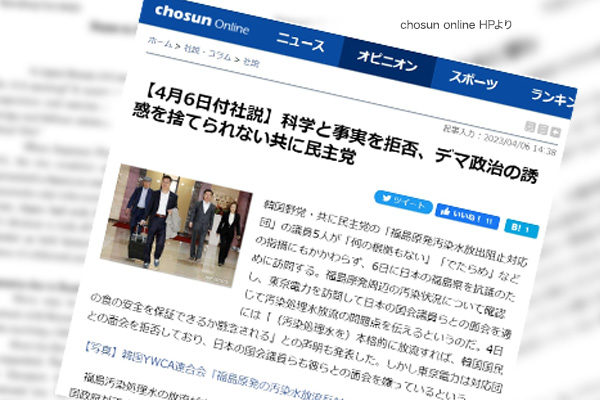Lawmakers from the Democratic Party of Korea, a South Korean leftist opposition party, visited Japan on April 6 through 8 to demonstrate their objection to the planned release of treated water from the Fukushima Daiichi Nuclear Power Station into the sea. Their visit to Fukushima came under fire in South Korea. Notably, the Chosun Ilbo, a major daily that has long led anti-Japan campaigns, carried an editorial titled “Rejecting science and facts, the Democratic Party of Korea is seduced into demagogic politics.” The editorial dated April 6 cited scientific grounds for rebutting the opposition party’s claim that the release is dangerous. This came as a surprise to me who has watched Japan-South Korea relations over a long term.
A major daily emphasizes the release as harmless
Criticizing the Democratic Party’s claim as groundless and fake, the Chosun Ilbo’s editorial noted that the release of treated water from the nuclear power station would exert no harmful effect on South Korea. It said:
“Five lawmakers will visit Fukushima to protest against the water release, despite the suggestion that their claim is groundless and fake.
“If the release of treated contaminated water from the Fukushima plant were to really affect South Korea, the South Korean government should officially address the issue instead of the lawmakers’ visit for protest. But the claim deviates far from facts.”
It is important to note that the newspaper describes the water as “treated contaminated water” not as simple “contaminated water.”
The editorial detailed a joint simulation by the Korea Institute of Ocean Science and Technology and the Korea Atomic Energy Research Institute.
“If the treated contaminated water is released now, it will take four to five years to really reach waters near South Korea after going around the Pacific Ocean. Of course, the water then will have been diluted. Tritium in South Korean waters is predicted to increase only by one hundred thousandth. It is meaningless to check such number. Practically speaking, no effect will be exerted on human health. Nuclear energy experts say the same conclusion can be drawn for other radioactive materials such as cesium and strontium.”
Restrictions left on fishery product imports from Fukushima
Former Japanese Prime Minister Yoshihide Suga, incoming head of the Japan-Korea Parliamentarians’ Union, asked South Korean President Yoon Suk Yeol during his visit to Tokyo last month to understand the release of the treated water and abolish restrictions on fishery product imports from Fukushima. It was natural for Suga to do so because he made the decision to release the water when he was prime minister. Then, Kyodo News reported Yoon as telling Suga that he would seek the understanding of South Korean people even if it takes time, causing a big controversy in South Korea. The South Korean Presidential Office said Yoon made no such remark and that restrictions on fishery product imports would be retained. But opposition parties and leftist news media have growingly criticized the president over the reported remark. The problem thus represents an internal struggle within South Korea.
Regrettably, the Yoon government and conservative newspapers do not face the fact that the restrictions on fishery product imports from Fukushima “reject science and facts.” Japan has no choice but to reiterate what it should say.
Tsutomu Nishioka is a senior fellow and a Planning Committee member at the Japan Institute for National Fundamentals and a visiting professor at Reitaku University. He covers South and North Koreas.


